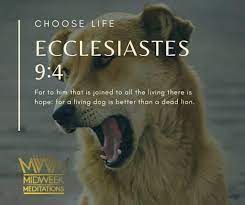
Hope, desire, accomplishment, authority—such things are of value only as long as he who possesses such qualities participates in the land of the living (Ecclesiastes 9:4). The Teacher concludes that a living dog is better than a dead lion, but to understand his meaning, we need to put his words in the context of ancient Israel. A dog was not a pet, nor was he thought to be man’s best friend. On the contrary, a dog was considered a despicable beast (cp. 2Samuel 9:8; 16:9). On the other hand, a lion was considered a noble and courageous creature (Numbers 23:24; Proverbs 30:30). In other words, there is more hope for joy in a poor, homeless life, than one can expect to have once he lies dead in the grave, and this is put in contrast with the challenges that come in life, whether they are considered fair or unfair, whether one is wise or a fool, great or small, strong or weak. The life of the living is better than the state of the dead.[1]
At this point in my study of the Book of Ecclesiastes I’m reminded of one of my favorite movies, the Shawshank Redemption. One of its characters, Brooks Hatlen, was paroled, but had a difficult time adjusting to life on the outside. He longed for the days when he was an important man, the prison librarian. He thought about killing the grocery store manager in order to go back to prison. Brooks was a bagger at the store. He despaired of life and hung himself in his room, just after he carved his name in the beam, to which he tied the rope. His last words were: “Brooks was here!”
Life in prison was meaningless, as far as the outer world was concerned. Nothing in prison mattered. Another character, Red, was also an important man in prison, more so than Brooks. He could get things from the outside for folks on the inside, but, after he was paroled, he, too, became a bagger at the same grocery store where Brooks used to work. Everything about prison life, all its labor, whether or not someone was important in that context, no one was able to take prison life and make it meaningful on the outside.
I believe this is the point of the Teacher at this time in his thesis. Folks who left Shawshank would rather be that ‘live dog’ on the inside than the dead lion, vis-à-vis life on the outside. As unfair and as troublesome as life was in Shawshank, it was preferred over one’s death as a parolee. Nevertheless, the Teacher didn’t mean for his readers to despair of life in the prison mankind inherited after his rebellion in Eden. He reminded them they were not alone. The Lord had given them joy in their labor, if they placed their trust in him, and no matter what else may happen to them in life, that joy was their portion, and the Teacher gave his readers four reasons to take hold of that joy.
___________________________________________________
[1] This conclusion stands in contrast to what the Teacher had said previously (Ecclesiastes 4:2; 7:1). Nevertheless, in each of those places the Teacher’s emphasis was upon other matters. The dead don’t suffer, therefore, their rest from pain etc. is better than a life of pain and suffering (Ecclesiastes 4:2). Accomplishment is better than beginning a project, so death is better than one’s birth (Ecclesiastes 7:1). But, in Ecclesiastes 9 the emphasis is upon not having a lasting effect upon our world, no matter what one does. All our works for good or for evil will end, and what we have given our lives to do will fail and be forgotten after we die. The sense is despairing of the value of one’s life once it is over.